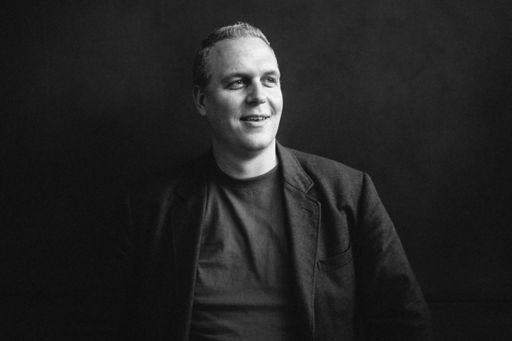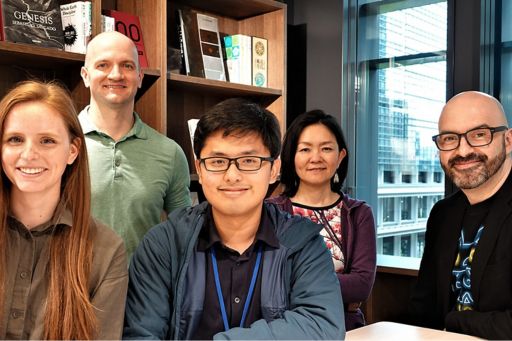At KPMG Ignition Tokyo (KIT), we have "AI Study Group", a group mainly for data scientists to share and discuss about AI technology, that has been held and open to everyone in KIT every week, and various topics related to data science have been covered. This time, Kawano of the Talent Management Team interviewed Haiyang Peng of the Data/AI Guild about the story of this study group, current activities and what they want to achieve in the future.
How did the AI Study Group start?
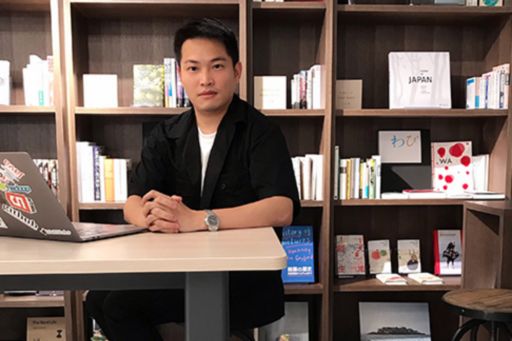
Data/AI Guild Leader, Senior Scientist Haiyang Peng
Kawano: It's been over a year since I started working at KIT. I believe, at that time, we already had this study group going on. Today, I am so excited to take this opportunity to ask you about the AIStudy Group. First of all, could you tell us how you started this Study Group?
Haiyang: When I first joined KIT, there were not many data scientists in the company yet, but the management team was already aware of the various business opportunities for AI solutions at that time. The engineer team was also using some AI technologies in the projects, and there was a clear need to deepen the AI knowledge across the entire organization. So, two months after joining the company, I decided to launch a study group. It was not a group exclusively for data scientists but aimed "to have a more systematic understanding of the basis of AI technology and to be a place for continuous learning across teams." My short-term goal at that time was to try to bring AI innovation to KIT’s projects and technology development.
Therefore, with the great support of the management team, this study group started with the participation of a wide range of people such as software engineers, UX / UI designers and researchers. At first, as I said, there weren't many data scientists, so we didn't have a team like we do now. Under such circumstances, engineers who understood AI technologies sometimes gave lectures. We also used some online course material from universities, such as Stanford University to learn from fundamentals. I would say, being keen to “learn the latest technology” has brought us together since that time. New technologies are invented day by day in Data Science. It's quite challenging to catch up the trend if studying alone, so it's definitely more efficient to study with and learn from the whole team by sharing “what you don't understand or can't solve”, and needless to say, it’s fun, too.
What the AI Study Group is aiming for.
Kawano: I can see that well the initial purpose of the launch was to raise the knowledge level about AI technology for the entire company. It's been about two years since then, and as we have a very strong data science team now, I would like to know more about current activities and things that this study group is aiming for.
Haiyang: Basically, there are two. The first is that it could be a place to discover new talents. Since we belong to an organization, we basically work on the assigned projects every day. However, in reality, there are people who say for example, "Actually, I'm also interested in NLP (Natural Language Processing) and have been studying for a long time." I have been hoping we can offer a place for our members to present their capability and interest in a less formal occasion. We may start from there and connect those talents with potential projects in the future, which in returns contributes to KIT’s continuous growth.
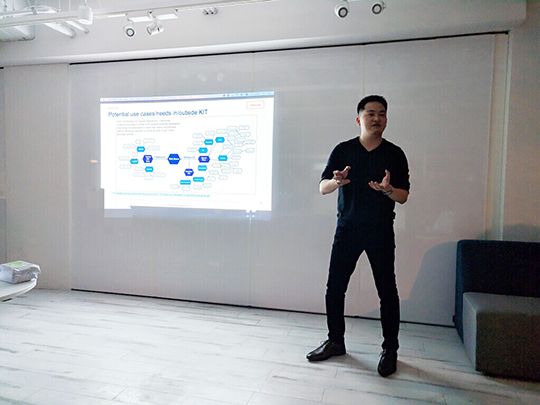
The other is to prepare for what you want to do in the future. For example, some software engineers may want to become data scientists in the future. For such members, I think that this study group can be a great opportunity to learn about AI and data science, and it will be a good guideline for what they need to learn in the first place. As a result, this study group may be able to provide internal talents new opportunities within the company, which I believe, is also important for the company.
Team to the next stage “AI Study Group 2.0”
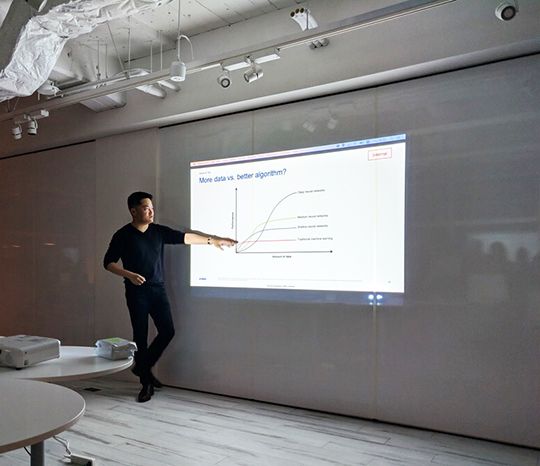
Kawano: Certainly, it is quite an ideal condition for the company to provide excellent talents a place to play an active role. It can be said that this is a very important initiative from the perspective of discovering and nurturing potential. So, how do data scientist team members do in the current AI Study Group? Is it different from before? How do you choose the topic?
Haiyang: We are now “AI Study Group 2.0.” It has evolved a lot. Currently, there are many data scientists, so we are focusing more on advanced and specialized content. We have several organizers including myself, and other members take turn to be in charge of facilitating the session as well. Instructors are selected according to the topic. Topics are selected from members and instructors’ suggestions, or sometimes chosen from what members have learned from online courses. As there is no restriction on topic selection, you can choose anything as long as it somehow related to Data Science. For example, if you have a problem that you do not understand in your own study, you can bring it to a study group and discuss about it, or you can also show off your achievement. It doesn't even have to be associated with the assigned project at all.
You can learn the most by being an instructor because you need to be well prepared to make a presentation. If you ignore this part, you'll get very sharp questions, and might see some harsh comments on the feedback survey after each session. Since we encourage frank and straightforward discussions, there were many times when it got hot (laughs).
Kawano: When I visited the study group last time, I was surprised at the extremely serious discussion.
Haiyang: Right, people may be surprised at the first time (laughs). Every member including me does not like to leave things that we don't understand or are ambiguous, so it is always encouraged to discuss them thoroughly. I feel our team is a group of people who have a strong desire to keep up with the latest trend in the field of data science, so it may be natural to have a heated discussion. I believe the curiosity of new knowledge has been the driving force for members to join the discussion or even debates in the study group.
Kawano: Yes, I agree. The AI Study Group is evolving, and then what do you want to achieve in the future?
Haiyang: The principals won’t be changed, but I hope this study group will always be a place for discussions, challenges, presentations, questions, debates, practices, or just a place to relax. We strongly hope that we can support all the learners in KIT through this opportunity. Going a little further, I would like our members to take advantage of this place as part of the team training program that started last year. For example, instead of taking an online course on your own and ending it, you can firmly establish that knowledge by presenting the content at this study group (needless to say, if you are taking a course with an empty mind and become a presenter, you will be in trouble during the session. (laughs)) ...
Kawano: I've always thought data scientists are doing something interesting besides their project works. How do you describe your team? What do you think the most attractive point about this team? What is the ultimate goal as a team in the future?
Haiyang: With one word, it's very organic. While individual member is highly specialized and performing independently within the company, they are also well organized as a team. I think that the AI Study Group also fosters a culture of recognizing the diversity of members, communicating firmly, and cooperating. Please let me quote our President and CEO Chatani’s vision for this team in the future: B. I. G. The first is to Become a top-quality team within the KPMG Group, the second is to Innovate existing methodologies/paradigms for the KPMG Group's business, and finally to Go beyond expectations. We will keep trying to add more fun and entertainment to our learning journey. Ideally, we want to design a mechanism to ensure the efficiency of fun learning without overwhelming our speakers.
Kawano: Hearing the story today, I know this team can do it. Really cannot take my eye off of the activities of the Data Scientist Team and the AI Study Group going forward! Thank you for your time today.
*Professional affiliation and official position in the article are at the time of publication.
Follow us on KPMG Ignition Tokyo LinkedIn for the latest news.
Connect with us
- Find office locations kpmg.findOfficeLocations
- kpmg.emailUs
- Social media @ KPMG kpmg.socialMedia


